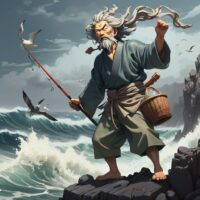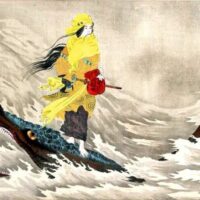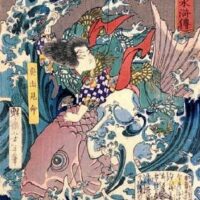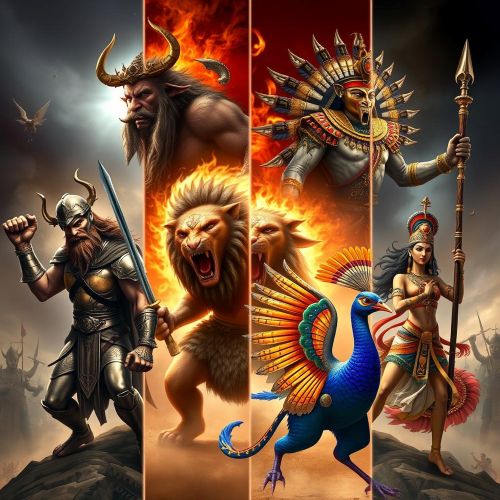Hoderi : The Enchanted Fisherman
Listen
At a glance
| Description | |
|---|---|
| Origin | Japanese Mythology |
| Classification | Demigods |
| Family Members | Ninigi (Father), Konohanasakuya-hime (Mother), Hoori and Hosuseri (Siblings) |
| Region | Japan |
| Associated With | Fishing |
Hoderi
Introduction
Hoderi, also known as Umisachi-hiko, is a significant figure in Japanese mythology, embodying the bounty of the sea and the skill of a fisherman. His story, though brief, imparts valuable lessons about responsibility, respect for nature, and the consequences of jealousy. Japanese mythology is rich with colorful characters, each adding depth to the cultural tapestry of the Land of the Rising Sun, and Hoderi stands out as both enigmatic and influential. He is revered for his valor, cunning, and resilience, making him a captivating subject of study and admiration. Exploring Japanese folklore reveals the rich narrative surrounding Hoderi, highlighting his physical attributes, familial ties, aliases, extraordinary abilities, and enduring impact on modern culture. His tale is one of sibling rivalry, magical artifacts, and divine intervention.
Physical Traits
Descriptions of Hoderi’s physical appearance in traditional texts are scarce. However, his role as a fisherman suggests he was likely strong and agile, necessary for handling boats and fishing nets. In Japanese mythology, Hoderi is often depicted as a robust and gallant figure with an aura of regal authority. His imposing stature reflects his prominence as a deity, and he is adorned in garments befitting his divine status. Traditional Japanese art portrays him as a hardy fisherman, embodying the strength and resilience of those who live by the sea, exuding strength and dignity that underscores his esteemed position within the pantheon of Japanese gods and goddesses.
Family
Hoderi’s lineage is rich with divine heritage. His father, Ninigi-no-Mikoto, is a grandson of the sun goddess Amaterasu, situating Hoderi within the lineage of one of the most revered deities in Japanese mythology. His mother, Konohanasakuya-hime, known for her beauty and connection to Mount Fuji, adds further distinction to his ancestry. Hoderi is the eldest of three brothers, with Hoori (Yamasachi-hiko) and Hosuseri as his younger siblings. Additionally, Hoderi is considered an ancestor of the Hayato people of Kyushu. As the grandson of the divine creators Izanagi and Izanami, his family connections include illustrious figures like the sun goddess Amaterasu and the storm god Susano’o, enriching his mythological persona with celestial significance.
Other names
Hoderi’s name varies across different sources. In the Kojiki, one of Japan’s oldest historical texts, he is called Hoderi no Mikoto. The Nihon Shoki, another significant chronicle, refers to him as Ho-no-susori no Mikoto or Ho-no-suseri no Mikoto. Additionally, he is commonly known as Umisachi-hiko, meaning “sea-luck prince,” highlighting his connection to the sea. Throughout Japanese folklore, Hoderi is recognized by various names, each reflecting different aspects of his character and story. These alternate names, such as Hoori, emphasize his resilience and determination, showcasing his ability to overcome adversity and solidifying his status as a revered figure in Japanese mythology.
Powers and Abilities
As a deity of considerable renown, Hoderi is endowed with numerous powers and abilities that set him apart from mortals. Among his most notable skills is his exceptional marksmanship, perfected through years of dedicated practice and divine aid. Legends recount his remarkable feats in archery, with his arrows consistently hitting their targets. Hoderi is also closely associated with agriculture, symbolizing abundant harvests and the cyclical renewal of nature.
A significant source of Hoderi’s power is his magical fishhook, a gift from his father, which ensured abundant catches and established his reputation as a master fisherman. Although the specific abilities of the fishhook are not detailed, it likely provided him with an extraordinary ability to locate fish and navigate the challenges of the sea. Some interpretations suggest the fishhook contained the spirit of the sea, granting him a unique connection to the underwater realm. Despite its advantages, the fishhook also exposed Hoderi to the unpredictable forces of nature, leading to pivotal events in his life.
The most prominent story involving Hoderi centers on the loss of his magical fishhook. His younger brother, Hoori, borrowed the hook but accidentally lost it at sea. Feeling immense guilt, Hoori embarked on a quest to retrieve the enchanted tool, journeying to the realm of the sea god Ryujin. With the assistance of Ryujin’s daughter, Toyotama-hime, Hoori successfully recovered the fishhook and returned it to Hoderi.
The story takes a dramatic turn when Hoori, having fallen in love with Toyotama-hime, decides to stay in the undersea world for a while. Meanwhile, Hoderi, consumed by jealousy and resentment over his lost birthright and his brother’s newfound fortune, is left behind. This tale serves as a cautionary lesson about the destructive power of jealousy. Hoderi’s initial carelessness with the magical fishhook sets off the chain of events, but it is his inability to forgive his brother and move forward that ultimately leads to his downfall.
Modern Day Influence
Although Hoderi is not as widely recognized as some other Japanese deities, he still holds a significant place in modern Japanese culture. Shrines dedicated to him can be found in coastal regions, especially in Kyushu, where he is regarded as an ancestor of the Hayato people, known for their seafaring skills. Hoderi also appears in various artistic forms, such as woodblock prints and Noh dramas, keeping his story alive in the cultural memory.
Hoderi’s narrative continues to resonate with timeless themes relevant to contemporary life, such as responsibility, the consequences of greed, and the power of forgiveness. His influence persists in modern Japanese culture, seen in literature, visual media, and rituals honoring Japan’s agricultural heritage. As a cultural icon, Hoderi inspires qualities of courage, perseverance, and resilience. His story remains particularly significant within Japan’s fishing communities, symbolizing the sea’s bounty and the virtues of hard work and humility, while also serving as a cautionary tale about jealousy.
Related Images
Frequently Asked Questions
What is lorem Ipsum?
I am text block. Click edit button to change this text. Lorem ipsum dolor sit amet, consectetur adipiscing elit. Ut elit tellus, luctus nec ullamcorper mattis, pulvinar dapibus leo.
What is lorem Ipsum?
I am text block. Click edit button to change this text. Lorem ipsum dolor sit amet, consectetur adipiscing elit. Ut elit tellus, luctus nec ullamcorper mattis, pulvinar dapibus leo.
What is lorem Ipsum?
I am text block. Click edit button to change this text. Lorem ipsum dolor sit amet, consectetur adipiscing elit. Ut elit tellus, luctus nec ullamcorper mattis, pulvinar dapibus leo.
What is lorem Ipsum?
I am text block. Click edit button to change this text. Lorem ipsum dolor sit amet, consectetur adipiscing elit. Ut elit tellus, luctus nec ullamcorper mattis, pulvinar dapibus leo.
What is lorem Ipsum?
I am text block. Click edit button to change this text. Lorem ipsum dolor sit amet, consectetur adipiscing elit. Ut elit tellus, luctus nec ullamcorper mattis, pulvinar dapibus leo.






